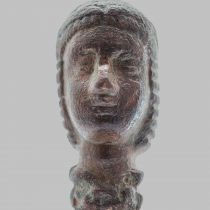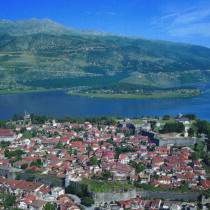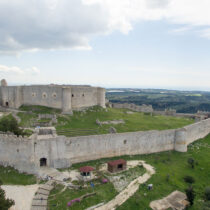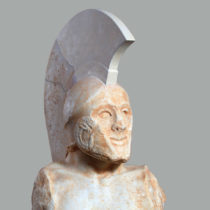Old Dongola wall paintings in Top 10 discoveries of 2023
This spring, media in Poland and abroad covered the discovery of magnificently preserved, unique paintings in Old Dongola, Sudan.
A stunning female bust in the Archaeological Museum of Amphipolis
It was found along with sixteen other busts of various types in a woman's grave in the eastern cemetery of Amphipolis.
TRAC 2024 Travel Bursaries
The TRAC Standing Committee traditionally offers bursaries for delegates to attend the annual conference.
Paleolithic humans may have understood the properties of rocks
A research group in Japan has clarified differences in the physical characteristics of rocks used by early humans during the Paleolithic.
Hunting of straight-tusked elephants was widespread among Neanderthals
Finds uncovered in the east of Germany show that Neanderthals stored vast amounts of meat and fat or temporarily aggregated in larger groups to consume these.
Chess from the Islamic world. The Benaki Museum Collection
A richly illustrated volume of a small but significant collection of chessmen, other games pieces and games boards held at the Benaki Museum of Islamic Art.
New type of settlement from the Wari State time found in Peru
An architectural complex of large dimensions, consisting of a two-story building and a courtyard with warehouses from the time of the Wari State.
Germany requested the return of the Lancelotti Discobolus
According to the Italian newspaper Corriere della Sera, Germany has asked Italy for the return of the Lancelotti Discobolus.
The near-arctic Stone Age cemetery of Tainiaro is far larger than previously believed
According to a recent study, there are at least 120 graves at Tainiaro, and the actual number could be even over two hundred.
The Imhotep Museum has reopened in Saqqara
The Imhotep Museum, dedicated to the legendary ancient Egyptian architect and his legacy, has reopened in Saqqara, following the completion of its restoration and development project.
Trade and Seafaring in Antiquity
This volume focuses on economic activity between the Mediterranean, the Indian Ocean, the Ancient Orient and the Far East in antiquity begins.
A Roman copper-alloy tortoise figurine found near Wickham Skeith
Cast in copper alloy, the object is in the form of a tortoise or turtle. The flat base shows no evidence for fixing, which suggests that it was a free standing figurine.
Bringing medieval England to life
Researchers have given medieval Cambridge residents the ‘Richard III treatment’ to reveal the hard-knock lives of those who lived in the city during the University's earliest years.
Place-making in the desertscape
Abstracts are due December 17 for the upcoming conference “Place-making in the desertscape” which will take place in Cairo, 27-30 April 2024.
Roman colloquium on Late Antiquity and Early Christian Studies
The first Roman colloquium on Late Antiquity and Early Christian Studies will be held at the Notre Dame Rome Gateway Center on Friday, December 15, 2023.
Beaver exploitation testifies to prey choice diversity of early humans
Exploitation of smaller game is rarely documented before the latest phases of the Pleistocene, which is often taken to imply narrow diets for earlier hominins.
600 years of tree rings reveal climate risks in California
An interdisciplinary collaboration used 600 years of tree rings from the San Joaquin Valley to reconstruct plausible daily records of weather.
Historical violence in Tasmania
A new study reveals how a Victorian collector traded human Aboriginal remains for scientific accolades.
All Crimean artefacts back in Ukraine
All of the remaining artefacts from the exhibition Crimea – Gold and Secrets of the Black Sea have been transferred by the Allard Pierson to Ukraine.
Late Prehistoric discovery turns archaeological assumptions on their head
Stela that challenges long-standing interpretations of how the carvings represent gender and social roles in prehistoric times.
Unearthing ancient social structures with sediment DNA
An ERC Consolidator Grant was awarded to Benjamin Vernot, leader of the Max Planck Research Group for Ancient Environmental Genomics.
Over 100 medieval coins were discovered in Szprotawa
A hoard of approximately 100-150 coins, initially identified as the so-called Silesian bracteates, was discovered during a rescue excavation.
Eastern Baltic’s first farmers and hunter-gatherers lived together
Agriculture was not so enthusiastically welcomed and introduced in places of the previous gathering, fishing and hunting economy.
Was “witchcraft” in Koli park cave based on acoustic resonance?
A new article investigates the acoustic properties of the Devil’s Church and explores whether they explain the beliefs associated with it.




























